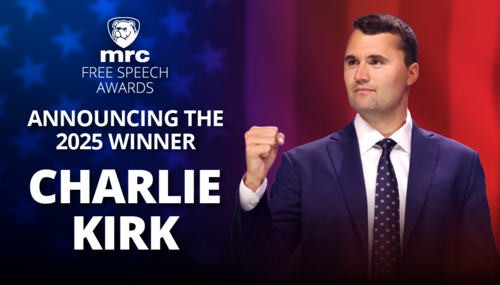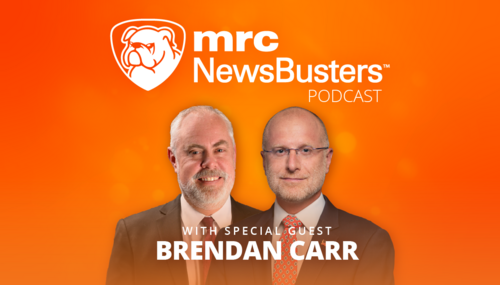 Inside Tuesday’s Washington Post, their new gay “manners” columnist, Steven Petrow, demonstrated once again that he isn’t really devoted to “Civilities,” as his advice/political column is titled. It’s all about forcing a homosexual revolution, and if someone finds that rude or uncivil, then they can politely stuff it.
Inside Tuesday’s Washington Post, their new gay “manners” columnist, Steven Petrow, demonstrated once again that he isn’t really devoted to “Civilities,” as his advice/political column is titled. It’s all about forcing a homosexual revolution, and if someone finds that rude or uncivil, then they can politely stuff it.
A surprising letter was picked up, under the headline “Did a lesbian couple bully Christian innkeepers over the right to marry on their farm?” Petrow had no sympathy for those Christian bigots. It began:
Dear Civilities: I am writing about the New York state couple who refused to allow a lesbian couple to use their farm for their wedding. As a gay man who recently married, I’m troubled by this situation because I find that too many gay people who say they are being discriminated against are not willing to see that others have different beliefs and values, especially when it comes to marriage rights. In planning my own wedding, I had only one bad experience when a vendor said it would not cater to my husband and me; I took my business elsewhere. As bad as this sounds, I believe that business owners should have the freedom to choose whom they serve — and that for members of our community to persecute people on their faith, beliefs and personal morals is wrong. So, here’s my question: Should we as a community take actions to force acceptance on businesses and companies that are not quite there with the changes with marriage? — Name withheld, Colorado Springs
A: Congratulations on your recent wedding and, of course, I’m glad that you found a backup caterer who would serve gay folks, including you, your husband and presumably some of your guests. Of course, it’s a shame that not everyone in your shoes gets to celebrate with their second-choice of vendors. For those who live in small towns or more conservative parts of the country where there may not even be a second choice, well, I guess they’re just out of luck.
Now, how did my slightly snarky response make you feel? I ask because regular readers know that I don’t buy into the theory that good manners are simply about making others feel comfortable. I tweaked you (gently, of course) for putting yourself and your wedding first.
In the same uncomfortable vein, I’ve often advised that those who witness a homophobic (or racist or misogynistic) “joke” should speak up at that moment and, at the very least, state: “That’s not a laughing matter.” That will probably make both the jokester and everyone else feel awkward, right? Too bad. Otherwise, your silence would be taken as agreement — a much worse result — than some discomfort.
In other words, “Civilities” is the wrong name for this column. Forcing awkwardness of the backward is the goal. Educating the savages on how to avoid speaking backwardly with backward terminology is Petrow’s goal. He lined up his LGBT experts to explicitly compare “homophobia” with racism, as usual:
Frankly, I wasn’t surprised to see some columnists’ blowback against the lesbian couple or New York’s $13,000 penalty against the innkeepers. For instance, the New York Post’s Andrea Peyser wrote: “Robert and Cynthia Gifford are decent people being punished for acting on their faith. This kind of government bigotry should appeal to no one.”
I was surprised, though, by the large number of my LGBT Facebook followers who seemed to share that view. One gay man posted: “Why ruin someone else’s livelihood, when you still found another venue, still got married, and are still just as happy?” And this from a lesbian reader: “Let us not start becoming bullies after everything we fought for.”
I must admit to being troubled and puzzled by the criticism of the lesbian couple, especially if that’s any measure of general public opinion. If the McCarthys were black, Asian or Jewish, the outrage would have undoubtedly been against the farm owners for denying the couple access to the farm.
“The arguments against anti-discrimination laws to protect LGBT people and racial minorities are eerily the same,” Adam Winkler, a law professor at UCLA, told me. He added that “it’s often forgotten that racial segregation was justified on religious grounds, just like today’s hostility to equal protection of gays and lesbians.”
I also spoke with James Esseks, director of the American Civil Liberties Union’s Lesbian, Gay, Bisexual, Transgender and AIDS Project, to understand better why many remain steadfast in their opposition to certain kinds of discrimination but not necessarily that based on sexual orientation. He said that because we’re still building the cultural and legal norm that discrimination based on sexual orientation should be against the law, people minimize its significance. It’s not as clear at this point as race or gender discrimination, Esseks said.
Petrow concluded that those apparently self-loathing homosexuals who subscribe to allowing some religious freedom are like the betrayers of Martin Luther King:
Clearly my sympathies lie with the McCarthys, not the farm owners. I can only imagine the hurt and humiliation the couple felt when they were turned away, and I applaud them for not taking the insult quietly. I wish only that their supporters were as outspoken as their critics. To quote the Rev. Martin Luther King Jr., “In the end, we will not remember the words of our enemies, but the silence of our friends.”




